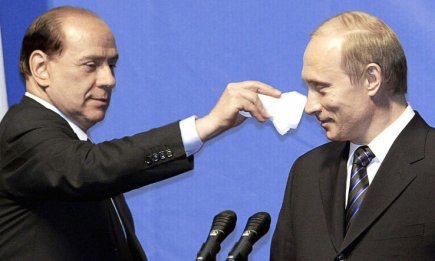Opvolger Berlusconi uit het HO?

Mario Monti is President van de prestigieuze Università Bocconiin Milaan. Befaamd is hij is Europa als langjarige Eurocommissarisvoor zowel de zware portefeuille Interne markt als die vanMededinging, als voorganger van Neelie Kroes.
In zijn CV vermeldt Bocconi ook nog de functies van “Honorary President of Bruegel, a European think-tank foreconomic policy, and member of the Reflection Group on the Futureof Europe in 2020-2030, established by the European Council andpresided by Felipe González.”
Hoogwaardig netwerk
Monti is tevens lid van de “Commission pour la libération de lacroissance française established by the President of the FrenchRepublic Nicolas Sarkozy and presided by Jacques Attali.” Dat hijin de wereld van het internationale bedrijfsleven nogsteeds uitstekende netwerken heeft blijkt uit zijn bijbanen. “He isInternational Advisor of Goldman Sachs and Member of theInternational Advisory Board of the Coca-Cola Company.”
Dat netwerk blijkt eens te meer uit de samenstelling van deinternationale adviesraad van Bocconi. Daarin zitten onder meerJosef Ackermann, voorzitter van de Deutsche Bank, Martin Feldstein,Professor of Economics at Harvard University, President Emeritus ofthe National Bureau of Economic Research en topadviseur van depresidenten Reagan en Bush sr. en Otmar Issing, President of theCenter for Financial Studies aan de Goethe Universiteit inFrankfurt, oud-lid van de Executive Board van de Europese CentraleBank.
Vanuit Azië zit in deze groep adviseurs Kishore Mahbubani, Deanof the Lee Kuan Yew School of Public Policy, National University ofSingapore. (U leest ‘Het daagt in het Oosten’,het interview vanScienceGuide met Mahbubani
Een bijna profetische rede
De rede die Mario Monti hield bij de meest recente opening vanhet academisch jaar – in december 2010 – is nu eens te meer actueelen bijna profetisch te noemen. Hij ging nadrukkelijk in op denoodzaak tot hervormingen in Italië en de EU om uit de dreigendecrisis te komen. U leest de meest saillante passages hieronder.
“Italy and Europe are going through a time of crisis: politicalcrisis, monetary crisis, a crisis of credibility. From thesecrises, at times, significant and long-lasting progress arises.Even so, crises shorten the field of vision, less attention isgiven to building the future and they cause one to focus more onachieving objectives in the near future. In recent years, recentmonths and recent days, the field of vision of time and space inItaly has been progressively, fearfully reduced.
Even the European Union, though not certain in its measures, hasbeen forced to narrow its own field of vision. Absorbed by theimperative of defending its currency, it has become moreintroverted, less attentive and less active on a global scale. Yetthis is the round in which it may fully participate, while none ofthe countries within it could do the same, not even the largestcountries. With all of you today, we would like to try to increasethe Italian and European field of vision in both time and space.Thus giving you an idea of the spirit in which our Faculty, alongwith our students, seek to position themselves each day of theacademic year.
We have recalled the need to speak less and observe more manytimes in the Italian debate, systematically looking towards thefuture and an international outlook, working on a project as agroup, setting deadlines. Just one example: in Poland, a countrywhose economy is growing quickly, and which has substantialpolitical weight in Europe by now, sometimes higher than Italy’s,the government has promoted a public debate on how to advancegrowth and improve society from now to 2030.
Italy, which has proved to be stronger than expected andstronger than other countries up to now, continues to have seriousproblems with the financial crisis of slow growth and lowcompetitiveness, combined with an economic and social structurethat tends to give the burden of the consequences of these problemsto young people and the weakest parts of the population.
A future must be built with goodwill: an inertial future is notencouraging. But what future is Italian public debate discussing?It is not 2030. The only future date that involves specificcommitment developed at an international level with sanctions is2015, the date of the Milan Expo. As for the rest, for the countryas a whole, the field of vision does not seem, or rather, did notseem, to go beyond 2013, the scheduled date of the nextelections.
Today the horizon seems to be cut even shorter: the farthesthorizon is 14 December 2010. In the past, Europe had offered toanchor Italy to future dates with serious commitments andsanctions: this was the case with the 1992 project for creating asingle market, this was the case with the single currency projectand its eager and successful pursuit.
Then Europe no longer offered these opportunities until thisyear, when, with the launch of the “Europe 2020″ strategy, eachcountry was asked to present their own national reform plan to theEuropean Commission by this November. Unfortunately, it cannot besaid that there has been attention in public debate in recentmonths on the topic of what Italy would like to be in 2020.Therefore, the occasion has not yet been utilized to encourageItalian society not to close its eyes on its own future.”
Meest Gelezen
Vrouwen houden universiteit draaiende, maar krijgen daarvoor geen waardering
Wederom intimidatie van journalisten door universiteit, nu in Delft
Hbo-docent wil wel rolmodel zijn, maar niet eigen moreel kompas opdringen
‘Burgerschapsonderwijs moet ook verplicht worden in hbo en wo’
Raad van State: laat taaltoets nog niet gelden voor hbo-opleidingen



